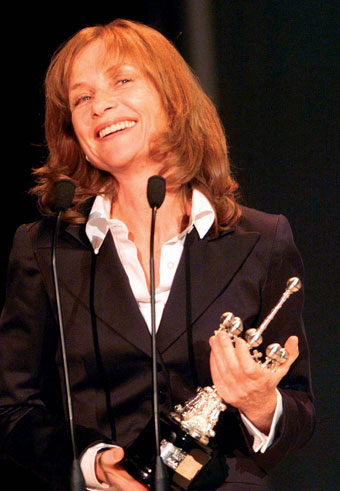She was sixteen when she appeared for the first time on a screen in a part already demonstrating the kind of character she was subsequently to embody in the cinema: the teenage daughter of the family in Claude Sautet’s César et Rosalie (César and Rosalie). The following year she brought life to the little Jacqueline in Les valseuses (Going Places). But we really and truly discovered her as the quiet star of Claude Goretta’s La dentellière (The Lacemaker). Barely out of her teens, Isabelle, born in Paris in 1955, succeeded in making her childhood dream become reality: she had wanted to be an actress. From then on, the presence of Isabelle Huppert has filled the screen in over eighty movies. She has worked with the most interesting European and American directors: Godard, Sauve qui peut (La vie) (Every Man For Himself); Pialat, Loulou; Tavernier, Coup de torchon (Clean Slate); Cimino, Heaven’s Gate; Hartley, Amateur; Ruiz, La comédie de l’innocence... Her name is unquestionably related to that of Claude Chabrol, the director who turned her into an unexpected assassin in Violette Nozière (Violette) (1978), a part for which she won her first award at Cannes. This was the birthplace of a friendship and a relationship, the fruit of which have been another five movies: Une affaire de femmes (The Story of Women), Madame Bovary, La cérémonie (A Judgement in Stone), Rien ne va plus (The Swindle), Golden Shell in 1997, and Merci pour le chocolat (Nightcap). Despite the fact that she has played the part of let’s say not very recommendable heroines, she has always given them an ambiguity somewhere between pain and humour which is doubtlessly one of her greatest virtues as an actress. In recent years she has starred in two movies showing the maturity of this double talent: the sharp knife edge of Erika in Michael Haneke’s La pianiste (The Pianist), which brought her a second award at Cannes and with whom she once again filmed in Le temps du loup (The Time of the Wolf), and the delicious old maid transformed into beautiful butterfly in 8 femmes (8 Women) by Ozon. Thirty years in the profession and numerous unforgettable caracters have made her an indespensable names in the world of cinema.





